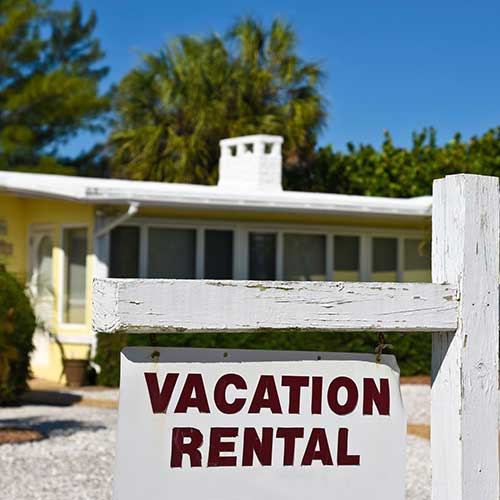How to Make Money on Vacation Rental Property
Last updated on Jan 14, 2026Jason KurtzVacation rental properties are more affordable than five-star hotels for travelers, but are their owners making good money? Rather than viewing it as passive income, successful vacation rental owners proactively maintain and market their rental properties. From how to advertise a vacation rental to how to schedule bookings, we provide a list of tips to help you optimize your vacation rental property.
Are Vacation Rentals Profitable?

A vacation rental can be profitable as long as you have a strong business plan, competitive pricing, and a steady stream of guests. In 2021, the industry’s total value in the United States was estimated at just over $13 billion. With a steady growth rate and increased exposure, the industry figures to continue expanding in the coming years, providing ample opportunities for prospective vacation rental property owners.
Is Owning a Vacation Rental a Good Investment?
With proper planning, owning a vacation rental property is a good investment. Like any other investment, investing in real estate carries some level of risk. However, it has a consistent track record of appreciating in value over time. Vacation rental properties also represent less of a commitment than other businesses in the hospitality industry.
Vacation Rental Tips
Whether you're just starting out in the vacation rental business, or you've been a property owner for years, it's important to stay ahead of hospitality trends to remain profitable. Follow the tips below to spruce up your rental listing, attract more bookings, and turn higher profits.
1. Assess Vacation Rental Location
Opening a vacation rental in a bad location limits your ability to make money. Because of this, you should research the area before purchasing a property. Take notes on the climate, the popularity of the area, and any nearby attractions. A good vacation rental location attracts visitors throughout the entire year and maintains a steady flow of customers. Some of the most popular locations for a vacation rental include:
- Tourist destinations
- Traditional vacation spots, like beaches or lakes
- Travel hubs
2. Invest in Your Property
A key mistake that many first-time vacation rental owners make is being unwilling to invest in, upgrade, or properly maintain their existing space. While it’s important to save money where you can, there are some instances where spending can be beneficial. Paying professionals to make repairs, renovating your property, and buying quality vacation rental supplies are all ways to give your listing a competitive advantage.
3. Improve Your Listing
If potential renters aren’t aware of your property, you can't expect to make much money on it. Because of this, it is essential that you effectively list your property. Whether you’re listing your rental on platforms like Airbnb, posting it on social media, or advertising it through a different platform, you can improve your vacation rental listing by following these tips:

- Write a thorough description: A good vacation rental description informs your guests about the property in a captivating way. Use descriptive words that set your property apart from the rest. You can also highlight local attractions or events that might interest travelers.
- Post accurate information: Accurate information is expected, while out-of-date or inaccurate information can have significant consequences on the reviews you receive and your ability to retain repeat guests.
- Use eye-catching photos: More than anything else, good photos can sell a potential guest on your vacation rental property. If it doesn't look enticing, they won’t consider staying there. Consider hiring a professional photographer to take pictures of your property. If you plan on taking your own pictures, be sure to keep the space clean, show off the features and size of the property, and emphasize what makes it unique.
4. Understand the Risks
To stay competitive, vacation rental owners should always know the risks they're taking on the potential challenges they may face. With any rental property, bookings can fluctuate throughout the year. For your own financial security, you should only invest in a vacation rental property if you have a steady stream of outside income. Whether you're unable to book any stays or you have to cancel reservations to make repairs, any period where you aren't making money can be disastrous if your vacation rental is your sole source of income.
5. Set Competitive Prices
Every vacation rental owner should try to understand their market and set competitive, yet reasonable, rates. Setting prices that are too high can discourage potential guests from booking a stay, while prices that are too low result in lost profits. To set ideal prices, follow these tips:
- Analyze the market: Stay in touch with the price of other rentals in your area to ensure your prices aren’t outdated. Consider pricing your property slightly beneath neighboring rental properties to attract more guests.
- Consider demand: Plan to change your rates during peak rental season and slow rental season. Adjusting your rates based on demand can help to attract more guests, even during the months when fewer people are traveling.
- Plan for events and holidays: Even if you're new to the area, staying in touch with local events can give you an advantage over your competition. Anticipating an influx of travelers helps you prepare early, positioning you for success.
6. Manage Your Schedule
Your property’s availability can play a significant role in how much money it makes. Follow these guidelines to optimize your schedule and maximize revenue:
- Manage your calendar: An out-of-date calendar can lead to double bookings, forcing you to cancel a reservation. Not only does this result in lost revenue, but it can deter the rejected guest from renting from you again and cause negative reviews.
- Manage check-in and checkout times: Consider implementing early checkout times for departing guests, giving you enough time to clean the property before the next guest arrives. This helps to reduce the wait time for your next guest.
- Promote longer stays: One way to facilitate more rentals is to encourage guests to stay longer. One way to do this is to offer discounts on longer stays. Guests who reserve the property for a single night provide revenue but can disrupt others looking to book a longer visit. If the property is reserved for a longer period, guests may simply book directly after the reservation is complete.
Owning a Vacation Rental FAQ

Owning a vacation rental and making it profitable can be confusing. Below, we've answered some of the most frequently asked questions about running a successful vacation rental business.
How to Calculate Vacation Rental Income
To estimate your vacation rental income, you’ll need to know your average nightly rate, average nights booked, and monthly expenses. By multiplying your average nightly rate and average nights booked, you’ll be able to project your average monthly income. Then, subtract your monthly expenses to find your takeaway earnings.
Hidden Costs of Owning a Vacation Rental
Vacation rental properties come with additional expenses that residential homes do not. These costs can vary, but it's essential to be aware of them before making your decision. Some of the more frequently encountered expenses include:
- Maintenance: While some maintenance costs can be expected on all properties, many maintenance expenses depend on the amenities you offer. Keeping a pool open, maintaining a hot tub, and offering video streaming services drive up your monthly bills.
- Increased utility cost: While homeowners are incentivized to cut costs and conserve utilities, vacationers are incentivized to do the opposite. Guests visiting your vacation rental property may leave lights on, windows open, or keep the air conditioning running, resulting in utility bills that are higher than expected.
- Replacement costs: To keep your rental property feeling fresh and updated, it’s best to replace certain things over time. To stay competitive, hotel room supplies such as bed linens, dishes, and decorations should be cycled out and replaced with updated products every few years.
What Can You Write Off on a Vacation Rental?
Not only does renting out a vacation property allow you to collect additional income, but you can write off some expenses for tax purposes. It's important to note that tax codes can vary depending on where you live, making it essential that you speak to a tax expert or educate yourself on local tax laws before making deductions. Some common vacation rental expenses that you can deduct from your taxes include:
- Repairs and renovations
- Property taxes
- Listing and marketing fees
- Travel expenses
- Legal fees
By making the correct marketing, scheduling, and business decisions, you can position your vacation rental property for success. Follow our vacation rental tips to maximize your profits and stay competitive in a growing industry.



